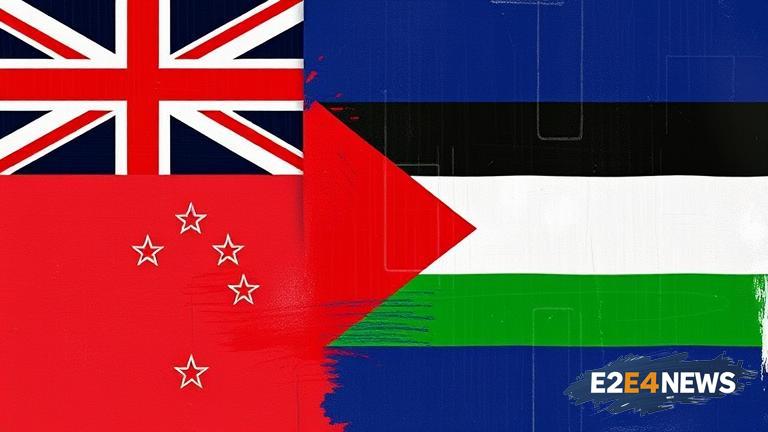The New Zealand government has initiated an urgent debate on the consideration of recognizing Palestine as a sovereign state. This move has been met with both support and opposition from various parties. The debate was sparked by a motion presented to the parliament, which called for the government to recognize Palestine as a state. The motion was supported by several MPs, who argued that recognizing Palestine would be a significant step towards achieving peace and justice in the Middle East. They also emphasized the importance of acknowledging the rights of the Palestinian people to self-determination and statehood. On the other hand, some MPs opposed the motion, citing concerns about the potential consequences of recognizing Palestine, including the impact on New Zealand’s relationships with other countries, particularly Israel. The opposition also argued that the recognition of Palestine should be a decision made by the international community, rather than a unilateral move by New Zealand. Despite the opposition, the motion was passed, and the government has agreed to consider recognizing Palestine as a sovereign state. The decision has been welcomed by Palestinian supporters, who see it as a major breakthrough in their struggle for statehood. However, the Israeli government has expressed disappointment and concern over the move, stating that it would undermine efforts to achieve a two-state solution. The recognition of Palestine by New Zealand would make it one of the few countries in the world to do so, and would likely have significant implications for the country’s foreign policy. The debate has also sparked a wider discussion about the role of New Zealand in international affairs, and the country’s commitment to promoting peace and justice around the world. The government has stated that it will carefully consider the implications of recognizing Palestine, and will consult with other countries and stakeholders before making a decision. The recognition of Palestine is seen as a key issue in the Middle East peace process, and New Zealand’s decision could have a significant impact on the region. The Palestinian people have been seeking recognition as a sovereign state for decades, and the move by New Zealand could be a major step towards achieving this goal. The international community has been calling for a two-state solution to the Israeli-Palestinian conflict, and the recognition of Palestine by New Zealand could be seen as a step towards achieving this goal. However, the issue is complex, and there are many challenges that need to be addressed before a two-state solution can be achieved. The recognition of Palestine would require a significant shift in the way that the international community approaches the Israeli-Palestinian conflict, and would likely involve a range of diplomatic and political efforts. New Zealand’s decision to consider recognizing Palestine has been seen as a bold move, and has sparked a wider discussion about the country’s role in international affairs. The government has stated that it is committed to promoting peace and justice around the world, and the recognition of Palestine is seen as a key part of this effort. The decision has also been welcomed by human rights groups, who see it as a major step towards promoting the rights of the Palestinian people. However, the issue is not without controversy, and there are many challenges that need to be addressed before a decision can be made. The government has stated that it will carefully consider the implications of recognizing Palestine, and will consult with other countries and stakeholders before making a decision. The recognition of Palestine by New Zealand would be a significant development in the Middle East peace process, and could have major implications for the region. The Palestinian people have been seeking recognition as a sovereign state for decades, and the move by New Zealand could be a major step towards achieving this goal. The international community has been calling for a two-state solution to the Israeli-Palestinian conflict, and the recognition of Palestine by New Zealand could be seen as a step towards achieving this goal. The issue is complex, and there are many challenges that need to be addressed before a two-state solution can be achieved. The recognition of Palestine would require a significant shift in the way that the international community approaches the Israeli-Palestinian conflict, and would likely involve a range of diplomatic and political efforts. New Zealand’s decision to consider recognizing Palestine has sparked a wider discussion about the country’s role in international affairs, and the government’s commitment to promoting peace and justice around the world. The recognition of Palestine is seen as a key issue in the Middle East peace process, and New Zealand’s decision could have a significant impact on the region. The government has stated that it will carefully consider the implications of recognizing Palestine, and will consult with other countries and stakeholders before making a decision. The decision has been welcomed by Palestinian supporters, who see it as a major breakthrough in their struggle for statehood. However, the Israeli government has expressed disappointment and concern over the move, stating that it would undermine efforts to achieve a two-state solution. The recognition of Palestine by New Zealand would make it one of the few countries in the world to do so, and would likely have significant implications for the country’s foreign policy. The debate has also sparked a wider discussion about the role of New Zealand in international affairs, and the country’s commitment to promoting peace and justice around the world.
